- Home
- Joan Lowery Nixon
Search for the Shadowman
Search for the Shadowman Read online
Praise for
Search for the Shadowman
An IRA Teachers’ Choice
“Thrilling … a riveting tale of suspense.” —School Library Journal
“Offers a fresh, tension-packed twist that will appeal to readers as well as their teachers.” —The Horn Book Magazine
“Old secrets, graveyard wandering, Texas outlawry—it’s a heady brew, and readers will relish seeing Andy solve the mystery even as they understand his final dilemma. It’s an engaging mystery, with one foot in the archives and one in the present day.” —The Bulletin of the Center for Children’s Books
Books by Joan Lowery Nixon
FICTION
A Candidate for Murder
The Dark and Deadly Pool
Don’t Scream
The Ghosts of Now
Ghost Town: Seven Ghostly Stories
The Haunting
In the Face of Danger
The Island of Dangerous Dreams
The Kidnapping of Christina Lattimore
Laugh Till You Cry
Murdered, My Sweet
The Name of the Game Was Murder
Nightmare
Nobody’s There
The Other Side of Dark
Playing for Keeps
Search for the Shadowman
Secret, Silent Screams
Shadowmaker
The Specter
Spirit Seeker
The Stalker
The Trap
The Weekend Was Murder!
Whispers from the Dead
Who Are You?
NONFICTION
The Making of a Writer
This is a work of fiction. Names, characters, places, and incidents either are the product of the author’s imagination or are used fictitiously. Any resemblance to actual persons, living or dead, events, or locales is entirely coincidental.
Text copyright © 1996 by Joan Lowery Nixon
Cover art © Special Photographers/Photonica (top); Kent Knudson/Index Stock (bottom)
All rights reserved. Published in the United States by Delacorte Press, an imprint of Random House Children’s Books, a division of Random House, Inc., New York. Originally published in hardcover by Delacorte Press, New York, in 1996.
Delacorte Press is a registered trademark and the colophon is a trademark of Random House, Inc.
Visit us on the Web! randomhouse.com/kids
Educators and librarians, for a variety of teaching tools, visit us at RHTeachersLibrarians.com
Library of Congress Cataloging-in-Publication Data is available upon request.
ISBN 978-0-385-32203-4 (trade) — eISBN: 978-0-307-82342-7 (ebook)
Random House Children’s Books supports the First Amendment and celebrates the right to read
v3.1
For my grandson,
Andrew Thomas Quinlan,
with love
Contents
Cover
Other Books by This Author
Title Page
Copyright
Dedication
Chapter One
Chapter Two
Chapter Three
Chapter Four
Chapter Five
Chapter Six
Chapter Seven
Chapter Eight
Chapter Nine
Chapter Ten
Chapter Eleven
Chapter Twelve
Chapter Thirteen
Chapter Fourteen
One Thing Leads to Another … and Another
Author’s Note
About the Author
CHAPTER ONE
“Why’d Mr. Hammergren give us such a dumb assignment?” Andy Thomas complained to his best friend, J.J. Andy impatiently kicked at a small rock. It skittered across the street, dust swirls rising in its wake. “Why can’t we study something important? Like outer space? What if a comet comes smashing toward Earth while we’re busy asking our relatives about what life was like when they were kids? Who cares?”
As J.J. brushed a strand of light brown hair from his eyes, he tried to be patient with his friend. “We’re studying Texas history, noodle brain. History means what happened in the past, not the future.”
“Texas history! It’s just a bunch of wars, cattle drives, and outlaws.” Outlaws? “Hey, that’s good! What if our relatives weren’t just ordinary? What if they were bandits and train robbers?”
J.J. didn’t answer.
“I mean it,” Andy said, beginning to enjoy his own idea of being related to a Western desperado who rode with a holster low on his hips.
“Sure,” J.J. finally answered. “I can just see my great-grandma Minna on a horse, waving smoking six-shooters. Or your great-aunt Winnie.”
Both Andy and J.J. bent over, shouting with laughter at the thought of their very proper relatives—elderly ladies of more than ninety—hooting and hollering down the main street of Hermosa.
When Andy was finally able to talk, he said, “You’ve got it easy, J.J. Your great-grandma’s done all that genealogy stuff. Your family has been naming their kids after the first James Jonathan Gasper forever. I forget, what are you, J.J., the fifth or sixth?”
“Seventh.”
As they reached the driveway to the Gasper family’s imposing white brick house with its impressive row of Ionic columns across the long front veranda, Andy teased, “Maybe I should interview Miz Minna, too. She’s been around so long she could tell us almost everything there is to know about every family in Hermosa.”
Instead of laughing, J.J. looked uncomfortable. “I know what people say about her gossiping, and they’re right. She wouldn’t be any help with your family’s stories.”
“I was just kidding,” Andy said, worried that he had hurt his friend. “Miss Winnie’s stories are going to be all I can handle. I’ve heard over and over about how it was before electricity came to West Texas, and about one-room schools and spelling bees and taffy pulls instead of television and video games. Now, because of Mr. Hammergren, the king of seventh-grade history, I’ve got to listen to it all over again.”
“Not just listen, write it down and get a grade!” J.J. reminded him. He laughed and ran toward his porch.
Write it down. Sure, thought Andy. As if I haven’t got anything better to do.
He headed toward home—a comfortable one-story brick house on a street two blocks from the Gaspers’. His family lived next door to his dad’s parents and Miss Winnie. She had left the family ranch and had come to live next door when Andy was only seven years old.
Andy pictured Miss Winnie and Miz Minna again and chuckled—not at the notion of the two elegant old ladies as part of the Wild West, but at the stuck-up, snippy rivalry that existed between them.
Neither Miss Winnie Bell Bonner nor Miz Minna Gasper would miss a party, the opening night of a play at the Hermosa Community Theater, or the visiting symphony orchestra that performed in the high-school auditorium each fall and spring. They were often in the same group. But their words to each other were as brittle and cold as ice splinters.
Once when Andy had asked his mother what caused Miss Winnie and Miz Minna to be like that, she’d answered, “Some old feud, I suppose. It’s gone on for so long, I wouldn’t be surprised if neither of them remembers what started it. I certainly don’t!”
When he’d asked J.J. if he knew, J.J.’s glance had slid to one side, and his face had turned red with embarrassment. “Miz Minna’s kind of stuck-up,” he’d said, “and my mom says she’s too quick to say what she thinks. Whatever happened between them was probably Miz Minna’s fault.”
Five years ago, when J.J. and Andy had become best friends, J.J. had introduced Andy to Miz Minna, a short, plump woman with a
face like a soft, pink-tinted marshmallow.
In her high, sugary voice, Miz Minna had settled herself into a high-backed, overstuffed chair and said, “So you’re Andrew Thomas. Turn around, child. Let me get a good look at you.”
Awkward and uncomfortable, Andy felt as if he had to follow her order.
When he had faced her again, Miz Minna had pursed her lips, continued to study him, and said, “Hmmm. Dark, curly hair, blue eyes, a little on the stocky side. You do look like a Thomas.”
Andy had laughed. “I am a Thomas.”
Her eyes opened wide, she blinked twice, and the sweetness slid from her voice like syrup down the drain. “Don’t get uppity. Unfortunately, I can see some of the Bonner blood in you too, young man.”
Puzzled, Andy began, “Miss Winnie is a Bonner, and my grandma Dorothy, so my dad—”
Miz Minna interrupted. She reached out to ruffle J.J.’s hair and said quickly, “Run along, y’all. Don’t make too much noise, don’t break anything, and don’t get into trouble.”
As soon as they’d left the room, J.J. had grinned and said, “Don’t mind Miz Minna. She orders me around like that all the time.”
Andy was glad that J.J. wasn’t as stuck-up as his great-grandmother. He guessed if anybody had a right to be conceited, it was J.J. The library, the bank, the high school, Hermosa’s largest department store, and even the fountain in the park were named after the original James Jonathan Gasper, one of the men who had helped build the town of Hermosa. Gasper’s bronze statue stood tall and dignified in front of the court-house. Even under a crown of pigeon droppings it looked impressive.
As Andy ran up the driveway to his back door, he wished once more that his class could have left the past behind and written instead about the future. The future was exciting, especially outer space, but the past?
He sighed, knowing he didn’t have a choice. He wanted a good grade, so he’d better interview Miss Winnie and get his paper written.
Andy gulped down a glass of milk and two chocolate brownies before he left a note for his mom on the refrigerator. He wanted her to find it as soon as she got home from her job at the bank. He grabbed a notebook and pencil and ran next door to visit his great-aunt, crunching through the dried cottonwood and elm leaves that dusted the lawn.
His slender, blond grandmother, Dorothy Thomas, led him into the parlor, cool and dim with the drapes drawn against the afternoon sun. The room smelled tangy with lemon oil from the highly polished tables, and a light fragrance of cinnamon drifted in from the kitchen.
Grandma Dorothy gave Andy a hug. “You’re out of breath. What’s the rush?” she asked.
“Homework,” Andy said. “We’ve got to write a history of our family. I’m supposed to start by interviewing the oldest member available.” As he glanced toward the glassed-in back porch, where Miss Winnie liked to read and knit, he lowered his voice. “She always tells the same old stories.”
“If you want new stories, ask her some new questions,” Grandma Dorothy said.
“What new questions?”
“That’s up to you.”
Andy looked at his grandmother with hope. “Hey, Grandma,” he said, “you’re kind of old. Maybe I could skip Miss Winnie and interview you.”
Grandma rolled her eyes and put her hands on her hips. “Now my dear, stick to Plan A. Talk to Miss Winnie first. Then you can interview the rest of us decrepit old folks.”
“What I meant,” Andy said, but his grandma was already on her way to the kitchen. Bracing himself, he walked to the sunlit back porch, with its wicker rockers, potted plants, and countless embroidered pillows, and greeted his great-aunt Winnie Bell Bonner. Today he looked at her and saw a tiny woman with tightly curled white hair and smile-line crinkles at the corners of her mouth and eyes.
As Andy settled on the footstool next to Miss Winnie’s rocking chair, he explained the interviews he had to do.
Even before he’d finished, Miss Winnie’s eyes sparked with indignation. “I don’t know why this Mr. Hammerhead’s got an interest in other folks’ family business.”
“Hammergren. I don’t think he’s being nosy, Miss Winnie,” Andy said. “He wants us to write the oral histories of our families so the old stories won’t be lost.”
“Some of those old stories are better off being lost and long forgotten,” she snapped.
“But you’ve been telling us stories for years about taffy pulls and what kinds of things you ate and the clothes you wore and all that stuff. You want those to be lost and forgotten?”
Miss Winnie hunched over, leaning forward, so that her nose was close to Andy’s. She smelled faintly of the dried rose petals Grandma Dorothy kept in bowls in the bedrooms.
“Everybody knows about trifling things like clothes and taffy pulls,” Miss Winnie said. “It’s the people stories your teacher wants. It’s the people stories that make history.”
“Okay,” Andy said. He opened his notebook and held up his pencil. “Tell me some people stories.”
Miss Winnie thought a moment. “Some stories are for the telling, some are not,” she said. “I’ll decide which are which.”
“Why should some stories not be told?” Andy asked. Suddenly he was curious. Really curious.
“Never you mind.” Miss Winnie shook her head.
Andy shrugged. “Okay, then,” he said, “I guess I should ask you some of the questions Mr. Hammergren had us copy off the board. They’re about transportation and how you handled sandstorms and how work was done in the home and stuff like that. They’re not exactly people stories. I don’t know where else to start.”
Miss Winnie leaned back and waved a hand, shooing away the questions like flies. “I’ll begin back as far as I heard tell, when in 1879 the Bonner family came to West Texas to live. You’ve got a pencil, Andy boy. I’ll start talking and you start writing.”
“I’m ready, Miss Winnie,” Andy answered, grinning. He remembered his conversation with J.J. “By the way, if there’s any bank robbers or horse thieves in the family, don’t forget to include them.”
Miss Winnie’s spidery-veined hands flew up to her cheeks. In a quavery voice she asked, “What have you heard? Just who’ve you been talking to?”
She looked so pale that Andy was scared. “Nobody! I was just teasing, Miss Winnie. Honest,” he said.
Miss Winnie rested her head against the back of the rocker, closed her eyes, and took three long, deep breaths. The pink came back to her cheeks, and her eyes opened as she answered, “I was, too. Now, let’s start with my great-grandfather, Malcolm John Bonner.”
CHAPTER TWO
Under Miss Winnie’s eagle eye, Andy dutifully wrote down almost every word she said. Malcolm John Bonner may have brought his wife and near-grown children to settle in Hermosa at great personal sacrifice, but Andy found it hard to really care.
Now part of his mind was on his great-aunt’s strange reaction to his comment about horse thieves and bank robbers. She’d said she’d tell him only those stories she wanted to tell. Was she hiding something?
Miss Winnie took a deep breath. “Now that we’ve got the begats out of the way, we’ll—”
“The what?” Andy interrupted.
“The begats. You know. Malcolm John and his wife, Grace Elizabeth, begat Malcolm John Bonner, Jr., who married Mary Ellen Hansen, who begat …” She shrugged impatiently and reached up to tug a small embroidered pillow to a spot behind her left shoulder. “You wrote it all down. I watched you. Let’s start with Malcolm John’s story.”
“Yes, ma’am,” Andy said.
“Malcolm John Bonner brought his family to West Texas in terrible poverty,” Miss Winnie began.
“Why’d they have to move? Especially if they were so poor?” Andy asked.
“They had no choice.” Miss Winnie shook her head sadly, but her glance at Andy was wary. “Grace Elizabeth was sickly in the damp, humid climate of Corpus Christi, where they lived. Their doctor said the only way she’d survive would be to mo
ve to a dry climate.”
“But they had no money to move.”
“I didn’t say that,” Miss Winnie insisted. “They were good, frugal people. Malcolm John Bonner built and ran a successful dry goods store. He sold it and bought ranch land here in Hermosa, where people were gathering because they’d heard the railroad was planning to come through. But the money he’d saved to build a house and buy stock … that was stolen. Every cent of it.”
Andy stopped writing and stared at Miss Winnie. The story was beginning to get interesting. “Who stole the money?” he asked.
“That was long ago and best forgotten,” she answered. She looked away from Andy and went on. “Malcolm John and his sons worked mighty hard for anyone who could afford to pay for hired help. Grace Elizabeth and her daughters became seamstresses and milliners, and …”
Andy had barely opened his mouth before Miss Winnie said, “That means they made dresses and hats for other folk.”
“Okay,” Andy said, and wrote fast.
“As I was about to say,” Miss Winnie told him, “the family worked hard, saved as much money as possible, and eventually were able to buy some livestock and develop their land.”
“Good!” Andy exclaimed, surprised at the rush of relief he felt that these relatives from the past had come through their troubles.
Grandma Dorothy walked into the room and rested a hand on Miss Winnie’s shoulder. “Andy, why don’t you come back tomorrow afternoon?” she asked. “We’re having an early supper so we can take in a movie.”
He closed his notebook and stood up. “Thanks for your help, Miss Winnie. See you.”
“Delighted,” Miss Winnie answered. “In the meantime, if you want, go up to the attic and look for a large cardboard box with ‘Winnie Bell Bonner’ printed on it. When I moved here from the ranch, I crammed it full of family papers and photos. You might find something you can use for this school project.”
“Great,” Andy said, although he didn’t mean it. Interviewing relatives and writing down what they said was going to take a lot of time. He edged toward the back door, but Grandma Dorothy stopped him. “This would be a good time to get the box, Andy. I know where it is. You’ll find it on top of a trunk against the back wall of the attic.”

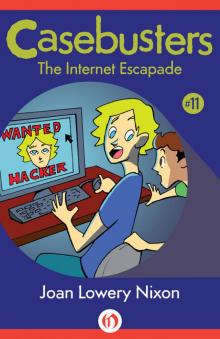 The Internet Escapade
The Internet Escapade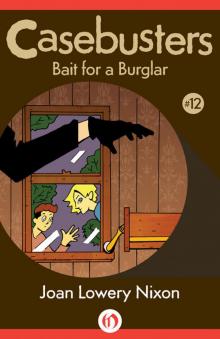 Bait for a Burglar
Bait for a Burglar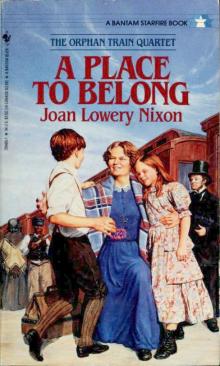 A Place to Belong
A Place to Belong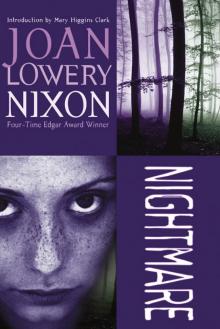 Nightmare
Nightmare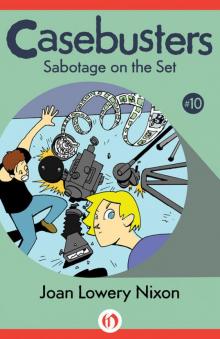 Sabotage on the Set
Sabotage on the Set The Other Side of Dark
The Other Side of Dark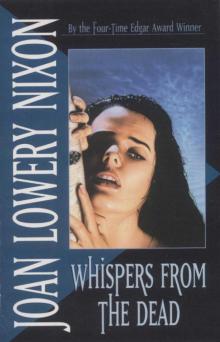 Whispers from the Dead
Whispers from the Dead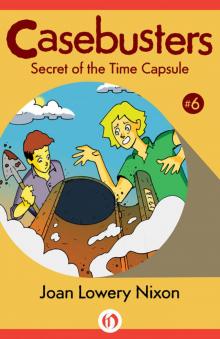 Secret of the Time Capsule
Secret of the Time Capsule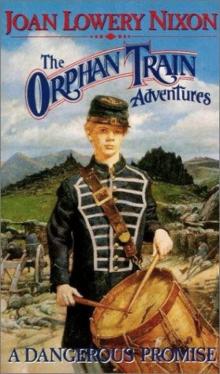 A Dangerous Promise
A Dangerous Promise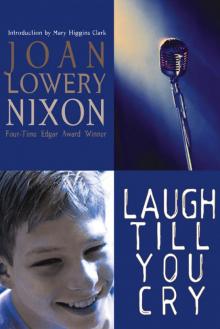 Laugh Till You Cry
Laugh Till You Cry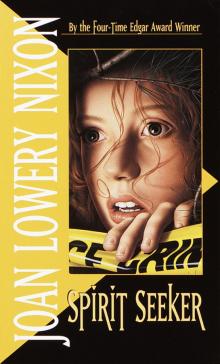 Spirit Seeker
Spirit Seeker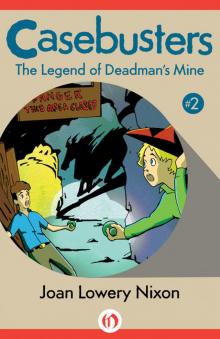 The Legend of Deadman's Mine
The Legend of Deadman's Mine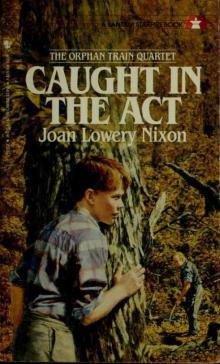 Caught in the Act
Caught in the Act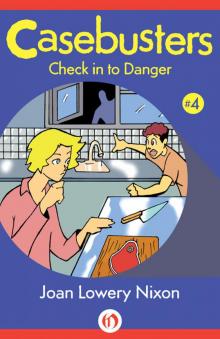 Check in to Danger
Check in to Danger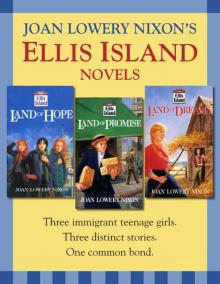 Ellis Island: Three Novels
Ellis Island: Three Novels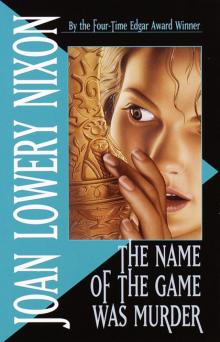 The Name of the Game Was Murder
The Name of the Game Was Murder The Haunting
The Haunting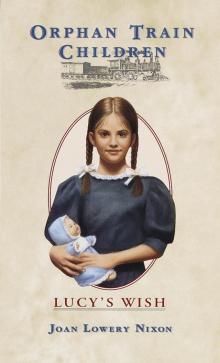 Lucy’s Wish
Lucy’s Wish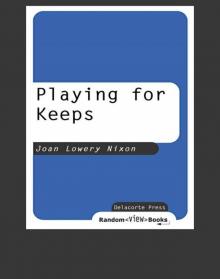 Playing for Keeps
Playing for Keeps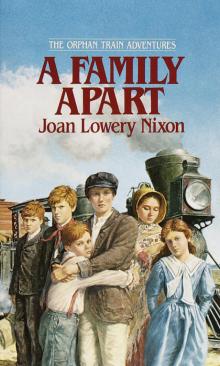 A Family Apart
A Family Apart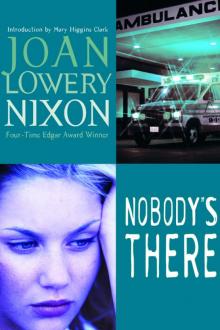 Nobody's There
Nobody's There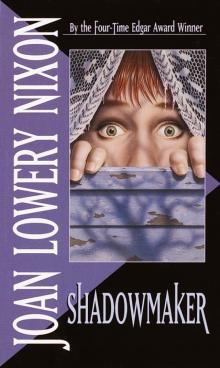 Shadowmaker
Shadowmaker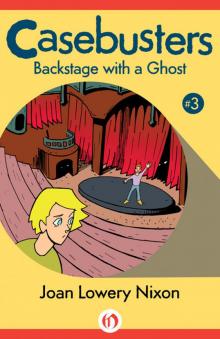 Backstage with a Ghost
Backstage with a Ghost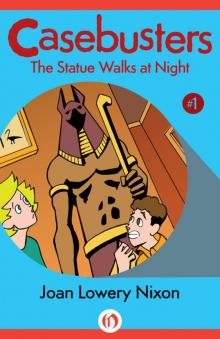 The Statue Walks at Night
The Statue Walks at Night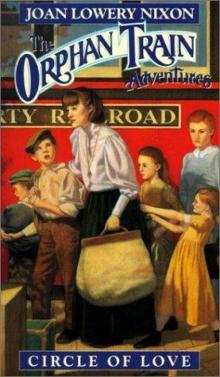 Circle of Love
Circle of Love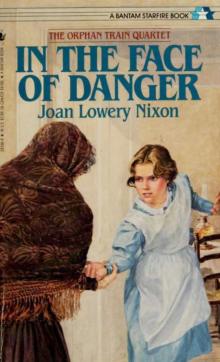 In the Face of Danger
In the Face of Danger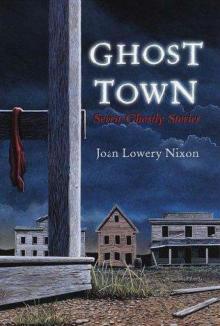 Ghost Town
Ghost Town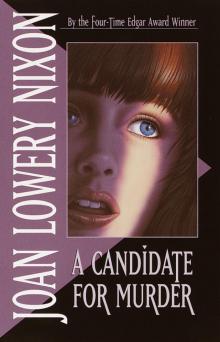 A Candidate for Murder
A Candidate for Murder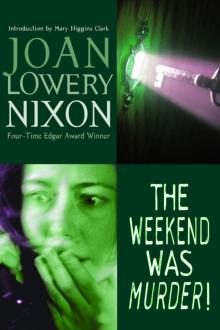 The Weekend Was Murder
The Weekend Was Murder The Island of Dangerous Dreams
The Island of Dangerous Dreams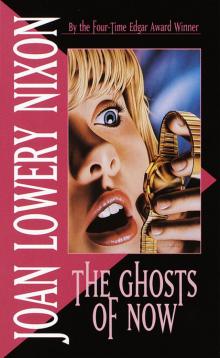 The Ghosts of Now
The Ghosts of Now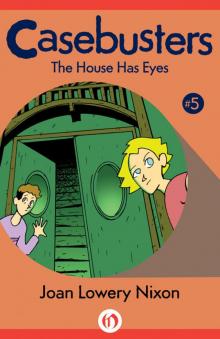 The House Has Eyes
The House Has Eyes The Dark and Deadly Pool
The Dark and Deadly Pool Keeping Secrets
Keeping Secrets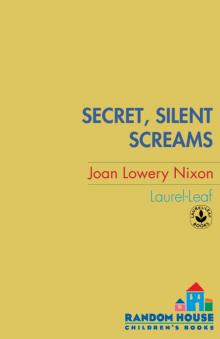 Secret, Silent Screams
Secret, Silent Screams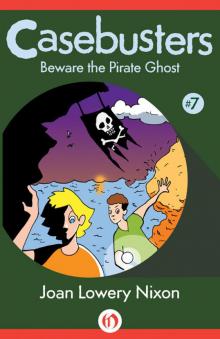 Beware the Pirate Ghost
Beware the Pirate Ghost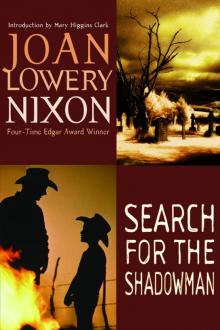 Search for the Shadowman
Search for the Shadowman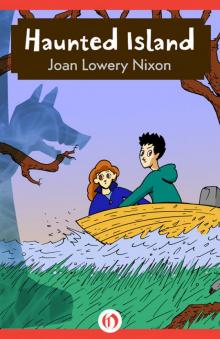 Haunted Island
Haunted Island